SI.com's 2015-16 NBA season awards

With the 2015–16 NBA season almost in the books, it's time for SI.com's writers to hand out some awards. While some races lack the usual intrigue, there's still plenty to debate. Here are our picks for MVP, Rookie of the Year, Most Improved Player and more.
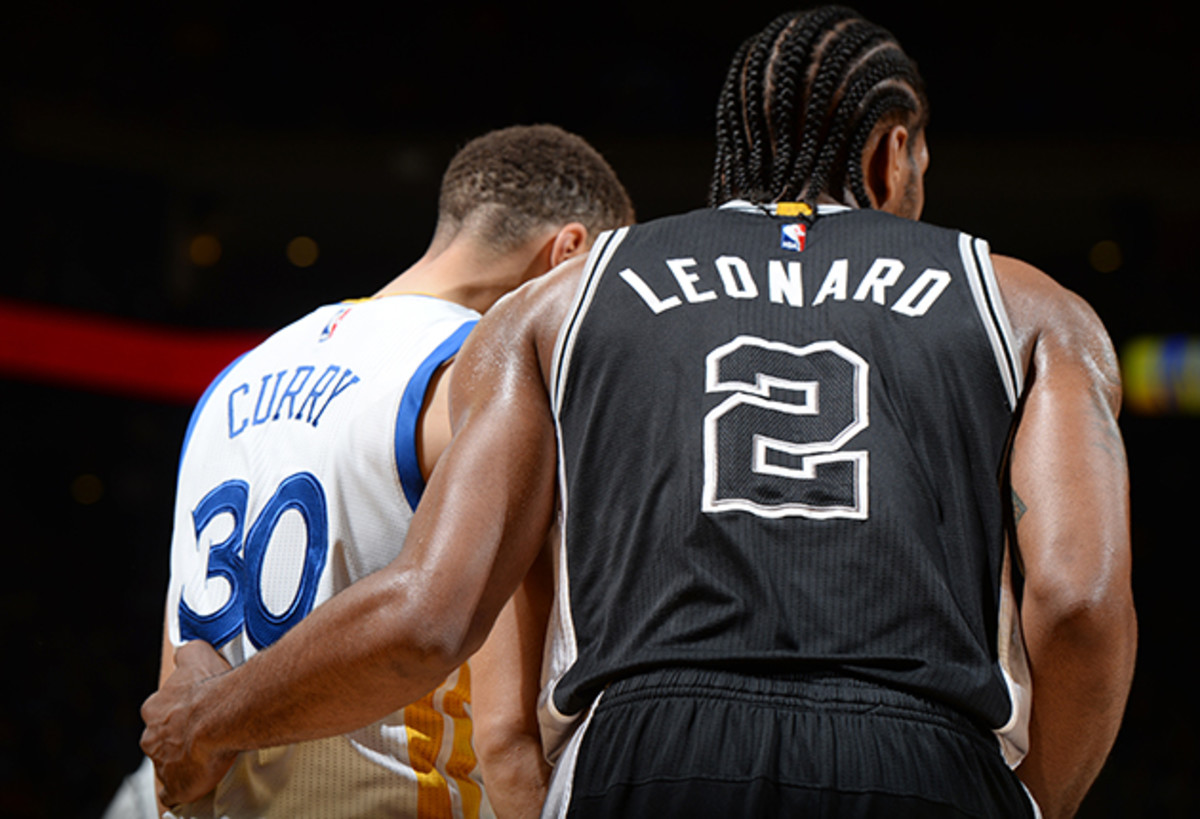
Most Valuable Player
Ben Golliver: Stephen Curry, Warriors
1. Curry, 2. Kawhi Leonard, 3. LeBron James, 4. Kevin Durant, 5. Chris Paul
This is the easiest MVP decision of the last decade, easier even than LeBron James in 2013. Curry led the Warriors to at least 72 wins, he shattered the NBA record for three-pointers, he captured his first scoring title (boosting his average by better than six points from last year), he led the NBA in PER, Win Shares and True Shooting %, he ranked second in Real Plus-Minus, and he posted the most impressive 50/40/90 shooting season of all time. Oh, yeah: he captured a few hearts and imaginations along the way too.
In an ordinary season, Leonard, James, Durant, Paul, Russell Westbrook and Kyle Lowry would all have fairly compelling MVP cases. Curry’s year wasn’t just extraordinary; it was extraterrestrial.
Lee Jenkins: Stephen Curry, Warriors
1. Curry, 2. Kawhi Leonard, 3. Russell Westbrook, 4. LeBron James, 5. Chris Paul
The NBA might as well have handed him the trophy at All-Star Weekend. Never has a MVP been so obvious or a race been so lopsided. The first back-to-back winner since LeBron James, Curry has captivated the sport like no player since Michael Jordan, as the Warriors have dominated the league like no team since the mid-90s Bulls.
Andrew Sharp: Stephen Curry, Warriors
1. Curry, 2. Chris Paul, 3. LeBron James, 4. Kawhi Leonard, 5. Kevin Durant
This may be the easiest MVP vote of my lifetime, so we can sidestep the self-explanatory case for Curry. He is in God Mode, and has been all year.
I do want to take this opportunity to say that, just like every other year, Chris Paul has been outrageously valuable in L.A. He will probably never win an MVP, but that's just part of the ongoing Greek tragedy that is his legend. He's the best player without a title, he's one of the best guards of all time, and somehow he is a punchline. Whatever. Just watch him control the game. He's basically Peyton Manning with a crossover and a midrange jumpshot. He not only held the Clippers season together when Blake Griffin went down, but they got better. In any other season, he's the MVP.
Rob Mahoney: Stephen Curry, Warriors
1. Curry, 2. Kawhi Leonard, 3. LeBron James, 4. Kevin Durant, 5. Russell Westbrook
Curry has done enough to be a unanimous MVP selection, provided no voter gets squirrelly. Regardless, the more compelling aspect of the race is the competition down the ballot. How does one choose to weigh teammate against teammate when it comes to the Thunder superstars? How much do we count LeBron’s extracurricular complications—which very much have a bearing on his team’s chemistry and performance—against his stellar play? And what of Chris Paul, who buoyed a Clippers team that ranks in the top 10 on both sides of the ball? There are no clear, definitive answers to these questions, though in my case I chose to credit James for his load-bearing style, preferred Durant to Westbrook on defensive grounds, and made Paul a regrettable omission.
• MORE NBA: Golden Season: Chronicling the Warriors' pursuit of history
DeAntae Prince: Stephen Curry, Warriors
1. Curry, 2. LeBron James, 3. Kawhi Leonard, 4. Russell Westbrook, 5. Chris Paul
Stephen Curry has had the NBA’s most prestigious individual award wrapped up since the midseason mark. In a Steve Nash-esque turn of events, Curry followed up his first MVP season with an even better performance. Curry remains the best player on the best team, and the fact that the Warriors recently hit 72 wins only works in his favor. Curry has dominated so thoroughly that he deserves to become the first unanimous winner.
Jeremy Woo: Stephen Curry, Warriors
1. Curry, 2. Kawhi Leonard, 3. LeBron James, 4. Chris Paul, 5. Draymond Green
Really, the only question is if this will be unanimous. What else is there to say? He’s the main reason for Golden State’s 72 wins, and managed to improve literally every statistical facet of his game (unless you care that his free throw percentage is .1 lower and he turned it over .2 more times). I’m always impressed when guys increase both their volume and shooting efficiency from year to year, but when you are a guy doing it while pulling 35-footers and corner fallaways and flipping parabolic scoop-shots over 7-footers every night, that’s some magical territory. If I write any further, it will approach cliché territory. Steph more than deserves it, again.
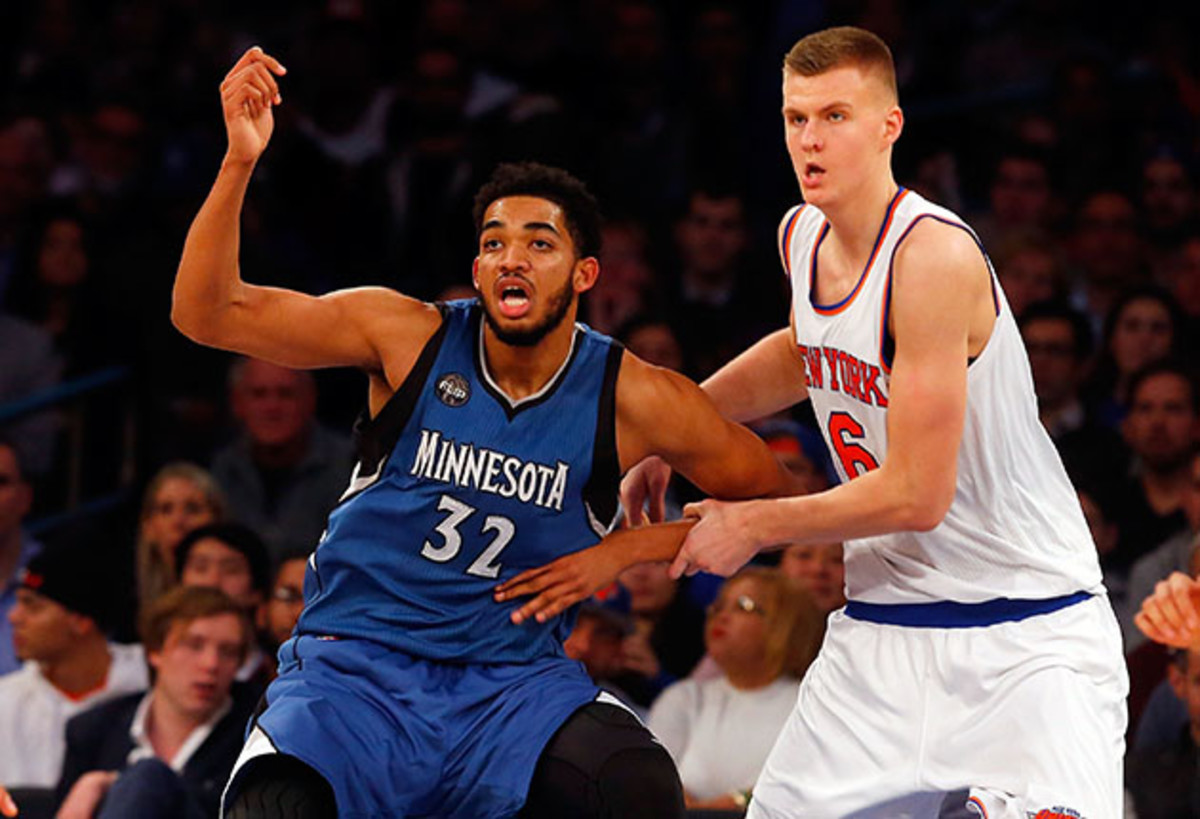
Rookie of the Year
Ben Golliver: Karl-Anthony Towns, Wolves
1. Towns, 2. Kristaps Porzingis, 3. Nikola Jokic
Towns put together one of the best seasons by a rookie big man during the three-point era, an especially impressive feat because he spent only one year at Kentucky. Even though he was still a teenager when he made his NBA debut last fall, Towns’s numbers (18.3 PPG, 10.5 RPG and 22.5 PER) compare favorably to the likes of Tim Duncan and Blake Griffin during their Rookie of the Year campaigns. Thanks to a versatile, complete offensive game and a body built to play defense in the modern NBA, Towns should enter next season on All-Star and All-NBA watch lists. In case you’d like fodder for “Which prodigy would you prefer?” debates, Towns has enjoyed excellent durability, logging more minutes as a rookie than Anthony Davis has in any of his four seasons.
Despite some second-half slippage, Porzingis still gets the nod over Jokic, as he’s played significantly more minutes, assumed a larger role and burden, and thrived in the face of much greater scrutiny. The 6’10” Jokic deserves third thanks to his strong advanced stats, per-minute production and unusual passing ability.
• MORE NBA: Timberwolves Doctrine: Inside look at Minnesota's core
Lee Jenkins: Karl-Anthony Towns, Wolves
1. Towns, 2. Kristaps Porzingis, 3. Devin Booker
This race was decided almost as quickly as Curry’s. Big men typically need a season or two to adjust to the NBA, but there is nothing typical about Towns, a dynamic 7-foot center who can handle the ball and shoot the fade-away. Once again, the Timberwolves didn’t win many games, but Towns inspired plenty of hope.
Andrew Sharp: Karl-Anthony Towns, Wolves
1. Towns, 2. Kristaps Porzingis, 3. Devin Booker
Just imagine how unfair this could get if the Wolves win the lottery and add Brandon Ingram. Would Adam Silver have to step in? Would the entire league have to stage a boycott? Would Sixers fans walk away from basketball forever? These are all questions to consider as the NBA lottery approaches. To be clear, though, the fundamental unfairness of the Wolves future begins and ends with the next 10 years of Karl-Anthony Towns.
Rob Mahoney: Karl-Anthony Towns, Wolves
1. Towns, 2. Kristaps Porzingis, 3. Nikola Jokic
An open-and-shut case. Towns catapulted his way into the NBA ranks with an all-time rookie season: well-rounded, efficient, defensively sturdy, and strikingly well-balanced. In time Towns should be one of the league’s very best players. For now, he’ll have to settle for this mantle-filler and acknowledgement of one of the best seasons ever recorded by a player 20 years old or younger.
DeAntae Prince: Karl-Anthony Towns, Wolves
1. Towns, 2. Kristaps Porzingis, 3. Devin Booker
Karl-Anthony Towns was primed for this performance well before he entered the NBA. For all intents and purposes, he’s been a pro since the day he left high school. He accepted a role at Kentucky and performed it to the best of his abilities before entering the NBA and making good on every expectation set before him. Towns averaged 18.3 points and 10.5 rebounds as a rookie and emerged as the brightest of the young stars in the NBA pipeline.
Jeremy Woo: Karl-Anthony Towns, Wolves
1. Towns, 2. Kristaps Porzingis, 3. Devin Booker
This one was always easy, and only got easier as Towns and the Wolves came on strong in the back end of the season. The numbers, of course, are really the only case you need (18.3 points, 54% FG, 35% 3FG, 10.5 rebounds, 1.7 blocks). Soak those up for a minute. But watching Towns create mismatches on both ends emanates so much possibility, whether he’s facing up a slower-footed defender, bottling up a driver or stepping out on a guard. With his seemingly exponential development curve, Minnesota is poised for an leap faster than anyone could have guessed. Remember when this particular race didn’t feel clear cut? Sorry about that.
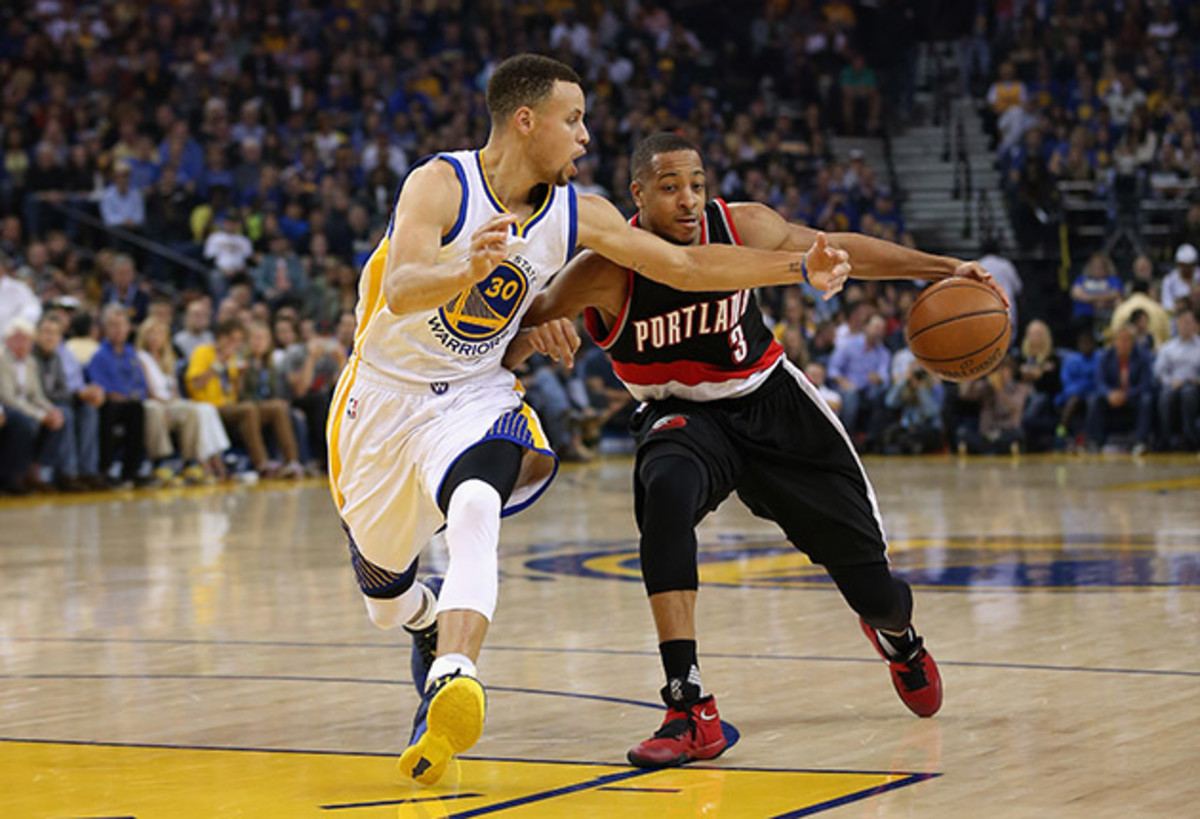
Most Improved Player
Ben Golliver: C.J. McCollum, Blazers
1. McCollum, 2. Giannis Antetokounmpo, 3. Kemba Walker
There’s more to McCollum’s candidacy than simply his gigantic, oft-cited year-over-year scoring increase (6.8 PPG in 2014–15 to 20.9 PPG in 2015–16). While he enjoyed some nice moments in the 2015 playoffs, McCollum entered this season needing to prove that he could be a starting-quality player, that he could fit alongside another ball-dominant guard in Damian Lillard, and that he could hold up for big minutes after missing time early in his career with a foot injury. He answered all three of those questions in the affirmative, posting career-best shooting and efficiency numbers while stepping up as a cornerstone for a top-10 offense.
The freakishly talented Antetokounmpo fully blossomed after the All-Star break, taking on new playmaking responsibilities that helped him post career numbers across the board in his third year. The scope of Antetokounmpo’s growth has been so significant that it’s easy to envision him on the East’s 2017 All-Star team. In his fifth season, Walker made the most of an improved supporting cast by posting career-highs in scoring, shooting and player efficiency for a Hornets team that far exceeded expectations.
Lee Jenkins: Kemba Walker, Hornets
1. Walker, 2. C.J. McCollum, 3. Jae Crowder
By tweaking his jump shot, Walker helped open the Charlotte offense and change the Eastern Conference outlook. Walker has always put up points, but now he is scoring more efficiently, hitting threes and forcing defenders to climb over screens. As a result, he is getting a head start en route to the paint, becoming the playmaker the Hornets envisioned.
• MORE NBA: Redick, Barnes headline fourth annual floppies awards
Andrew Sharp: Stephen Curry, Warriors
1. Curry, 2. C.J. McCollum, 3. Nicolas Batum
I promise I'm not trying to be that obnoxious counter-intuitive guy with this vote. I just really can't believe how much better Curry got this year.
He was excellent in 2015, but that's how you'd describe him: Excellent. Efficient. Clinical. The perfect player for a perfect system. All of this was feint praise in its own way. Efficiency numbers are cool, but that's not how we talk about most great players. A year later... Curry will have me texting friends in disbelief, only to realize that a week before I sent the basically same message after a different Warriors game. He is the player who inspires five-minute conversations the morning after, where half of what's said is, "Oh my god," and "Is this real?" That's how we talk about the greatest players ever. After last year's excellent MVP year, Curry is now in a whole different category.
Rob Mahoney: Stephen Curry, Warriors
1. Curry, 2. C.J. McCollum, 3. Ian Mahinmi
Who has a better claim to this award than the reigning MVP who then decided to destroy all reasonable standards of what constitutes an acceptable shot? The effect Curry has on a game isn’t just greater than any other player in the league at this point. It’s substantially more profound than even the leverage he demonstrated last season. His willingness and ability to take 30-footers has made even stout defenders do silly things in their overreaction. What choice do they have? The way Curry has evolved since last season has exaggerated the geometry of how he and the Warriors dominate. That can’t be overlooked—not when every inch of progress beyond superstardom is so powerful.
DeAntae Prince: C.J. McCollum, Blazers
1. McCollum, 2. Jae Crowder, 3. Stephen Curry
It’s not just C.J. McCollum’s seismic jump in scoring that made him the NBA’s Most Improved Player. His value to the Trail Blazers skyrocketed when the team lost four starters. Expected to fall to the bottom of the Western Conference standings, the Blazers stayed afloat behind the brilliance of Damian Lillard and the steady stream of production from McCollum, an offensive wizard who makes the most of his athleticism, ballhandling and shot-making ability.
Jeremy Woo: C.J. McCollum, Blazers
1. McCollum, 2. Giannis Antetokounmpo, 3. Jae Crowder
There’s a good chance McCollum was worthy of more than 15 minutes per game last season, so his rise may be less a case of meteoric improvement and more an appropriate dose of opportunity. But what he’s done with those minutes can’t be ignored—his uptick in production and role in keeping the Trail Blazers far from the bottom of the barrel (as many predicted, myself included). McCollum took that increased volume of shots and improved from the field, from three and from the line (up to 44.8/42.1/82.7, respectively) on his way to a Top-20 scoring finish and an unlikely return to the playoffs. Not bad.
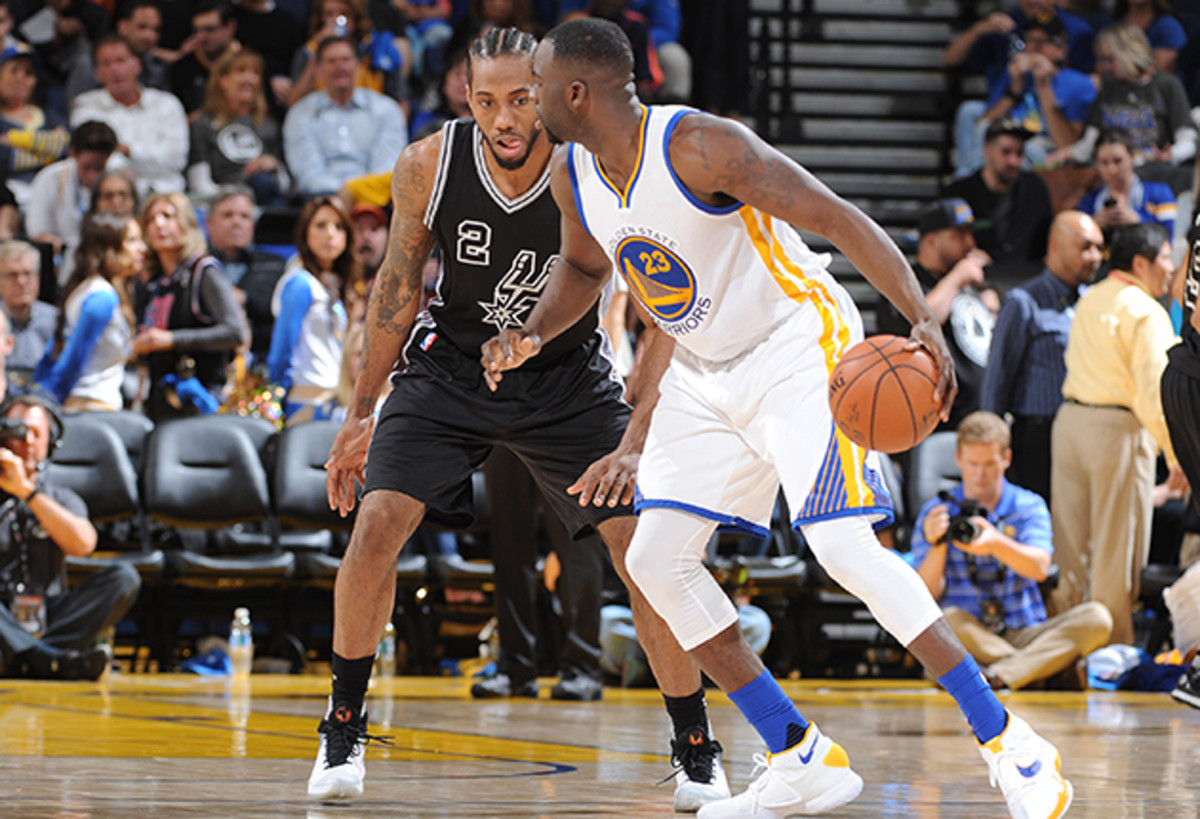
Defensive Player of Year
Ben Golliver: Kawhi Leonard, Spurs
1. Leonard, 2. Draymond Green, 3. DeAndre Jordan
As the best defensive player on the league’s best defense, Leonard has an impeccable case to win this award for the second straight season. Although he logged the most minutes of his career and posted career-highs in scoring and usage rate, Leonard didn’t slack a bit on the defensive end. His versatility, strength, length, footwork, instincts and competitive desire stand out on a nightly basis, and he predictably ranks near the top of the leader board in Defensive Real Plus Minus, Defensive Win Shares and Defensive Rating. Usually the descriptor “fearsome” is reserved for bigs like Bill Russell or Kevin Garnett, but Leonard has become a truly fearsome defensive presence, capable of taking star players out of a game and of turning defense into offense with his ability to pick pockets and read passing lanes.
Green’s excellence defending both the four and the five continues, as he boasts a fantastic motor, a high basketball IQ and a knack for contesting shots. While Golden State’s defensive numbers have slipped slightly this season, Green has posted record-setting plus-minus numbers and strong defensive stats across the board. Jordan, a classic paint-patrolling, shot-blocking and board-clearing big man, takes third for reliably captaining the Clippers’ sturdy defense during Blake Griffin’s lengthy absence.
Lee Jenkins: Kawhi Leonard, Spurs
1. Leonard, 2. Draymond Green, 3. DeAndre Jordan
Leonard won this award last season, despite missing 18 games, and he has an even stronger case this time around. The Spurs boast the best NBA defense in a decade, largely because of Leonard, who can practically remove the opposition’s best wing from the game plan. Leonard is a superstar, but defense remains his foundation, and he doesn’t let it slip.
Andrew Sharp: Draymond Green, Warriors
1. Green, 2. Kawhi Leonard, 3. Jae Crowder
Kawhi Leonard will likely win this award out of deference to what the Spurs accomplished in the shadow of Golden State. That's fine. But Leonard won last year, too. At some point we should all acknowledge that as valuable as he's been to San Antonio, Draymond Green is every bit as crucial to a Warriors defense that's every bit as good as the Spurs. This is a tie for first, and since Draymond is about to be snubbed for the second straight year, he gets my vote in protest.
• MORE NBA: Hinkie's failure in Philly made the NBA fun
Rob Mahoney: Kawhi Leonard, Spurs
1. Leonard, 2. Draymond Green, 3. DeAndre Jordan
Green is wholly deserving of this award—a worthy foil in what has become a two-man race. Yet the defensive influence that Leonard wields as a wing player is too notable to ignore. It’s not unusual to see some shooting guard or small forward thrive as a singularly focused stopper. Far more unusual is the wing capable of transcending his matchup to control action all over the court. Leonard has a way scrounging up steals and impeding an opponent’s progress even when his positioning would suggest he’s outside of the play’s track. That opponents are increasingly aware of this allows the Spurs to back them into the corner.
DeAnae Prince: Kawhi Leonard, Spurs
1. Leonard, 2. Draymond Green, 3. Andre Drummond
It’s quite obvious who the NBA’s premiere defender is at this point. He might play for the NBA’s second-best team, but Kawhi Leonard stands shoulders above just about every NBA player—with Draymond Green being the rare exception—when measured on the defensive end of the ball. Leonard’s defensive effort did not fall off one bit after he became the focal point of the Spurs’ offense, and his maturation on offense reached yet another new level.
Jeremy Woo: Kawhi Leonard, Spurs
1. Leonard, 2. Draymond Green, 3. DeAndre Jordan
Leonard’s reputation as a defender has reached hyperbolic levels… and yet that’s pretty much entirely warranted. His dominance is eye-test approved and statistically supported: entering Sunday, Leonard led the league in Real Plus-Minus (+9.06), as well as Defensive Plus-Minus (+4.77) among players logging more than 30 minutes a night. The Spurs lead the league in net rating, defensive rating, plus-minus and points allowed, and it all starts with Leonard taking the toughest assignment nightly and, more often than not, winning the matchup. He’s earned this one for the second year in a row.
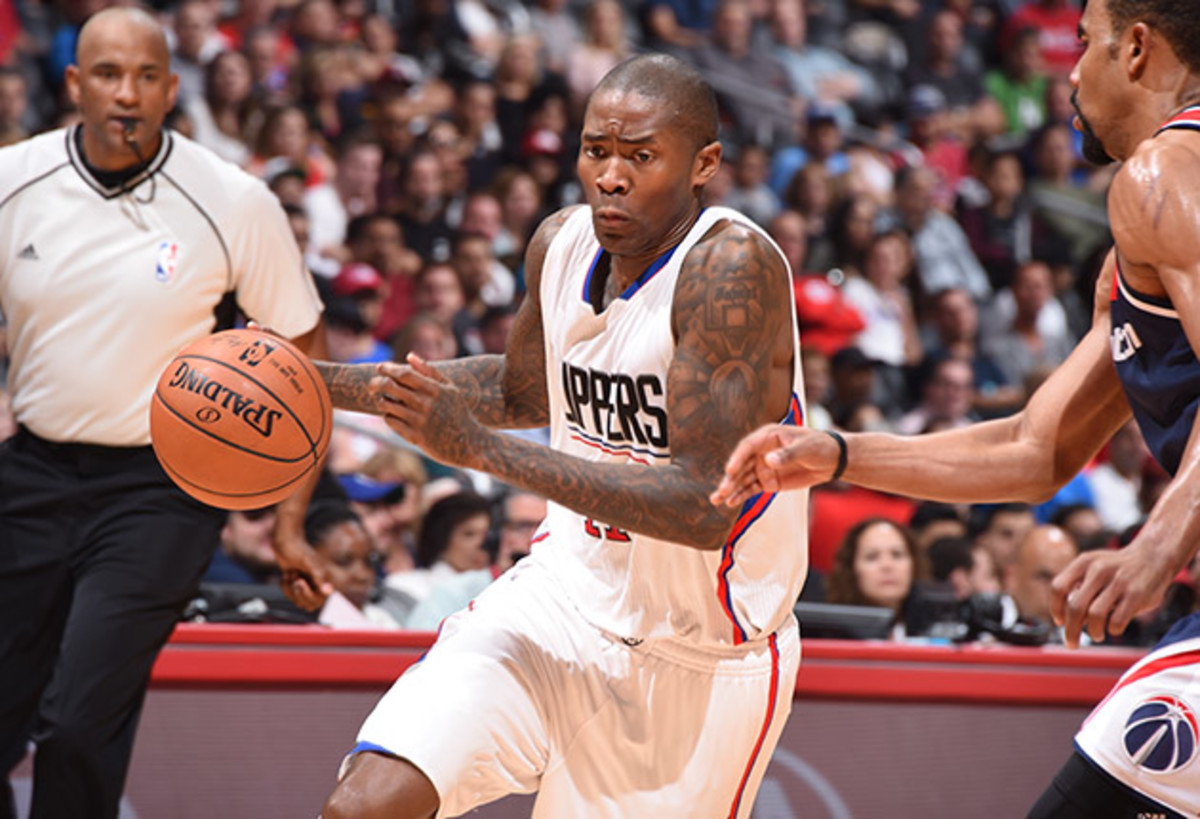
Sixth Man of the Year
Ben Golliver: Andre Iguodala, Warriors
1. Iguodala, 2. Tristan Thompson, 3. Ed Davis
This year’s Sixth Man race involves comparing apples to oranges to kiwis to guavas. The players with the best impact statistics and all-around games (Iguodala and Manu Ginobili) missed significant time. The highest-scoring reserves (like Ryan Anderson and Jamal Crawford) weren’t necessarily the most effective all-around contributors. The niche role players (Tristan Thompson and Ed Davis) were efficient, energetic and helpful, but served as complementary pieces rather than primary options. Despite pedestrian per-game stats and a long-term injury absence, Iguodala gets the nod due to his transformative presence and its direct implications on the title chase. When he’s at his best, Iguodala’s corner three shooting, playmaking, savvy defending and high basketball IQ combine to take Golden State from “excellent” to “completely unbeatable and capable of humiliating just about anyone.”
Thompson (who has started some this season but is still eligible for Sixth Man) and Davis round out the ballot because they get at the heart of the “added boost” that this award should represent. Both players extend possessions by crashing the offensive glass, they pile up second-chance points and easy finishes, and they maintain a positive tone with their high motors. Thompson gets the nod over Davis thanks to his superior defensive utility and impact.
Lee Jenkins: Jamal Crawford, Clippers
1. Crawford, 2. Enes Kanter, 3. Evan Turner
No one has ever won three different times, but no one has ever embraced the sixth man role quite like Crawford, who defines himself with the bursts of energy and flurries of points he brings off the bench. When Blake Griffin went out on Christmas night, the Clippers needed someone to infuse offense, and no reserve does that as consistently as Crawford.
• MORE NBA: Green: Jordan told me to break the Bulls' record
Andrew Sharp: Evan Turner, Celtics
1. Turner, 2. Boris Diaw, 3. Andre Iguodala
Andre Iguodala is clearly the most valuable sixth man, but I'm not going to give every single award to the Warriors. Boris Diaw may not have the best numbers among sixth man candidates, but he's second to Iguodala in value. Having said that, neither one is the choice, because if Evan Turner is in real contention for a year-end award, there's no way I'm not voting for Evan Turner.
Rob Mahoney: Andre Iguodala, Warriors
1. Iguodala, 2. Thabo Sefolosha, 3. Will Barton
Were there any standout Sixth Man of the Year candidate this season, Iguodala would likely be upstaged on account of his mere 65 games played. But this year’s field just isn’t quite strong enough to rule him out on a technicality—not when Iguodala proved to be such an critical piece for what may be the best team in NBA history.
DeAntae Prince: Jamal Crawford, Clippers
1. Crawford, 2. Will Barton, 3. Andre Iguodala
The Clippers survived 45 games without Blake Griffin because Chris Paul, J.J. Redick, DeAndre Jordan and Jamal Crawford were there to pick up the pieces. Playing without Griffin between Dec. 26 and April 3, the Clippers relied on an uptick in production from its star players to make up the difference. Crawford played a large part in that, and his work this season should make him the first three-time sixth man award winner.
Jeremy Woo: J.J. Barea, Mavericks
1. Barea, 2. Andre Iguodala, 3. Jamal Crawford
OK, so this one’s admittedly out of left field, but as up-and-down as this weird, possibly over-the-hill Mavericks team has been, Barea’s contributions have stayed consistent. He’s especially picked it up since joining the starting lineup with Deron Williams out, leading Dallas to six straight wins and probably saving the team’s season before a groin injury put his final few games in doubt. On a per-36 minute basis, Barea averaged 17.6 points and 6.5 assists. In 15 starts, he averaged 17.5 and five. When he’s scoring, Dallas tends to be winning (7–2 in his efforts of 20-plus). Though the Mavs don’t bring the glitzy team success factor, he’s been as crucial to his team’s success as any bench player. Without him, Dallas would be on the outside looking in.
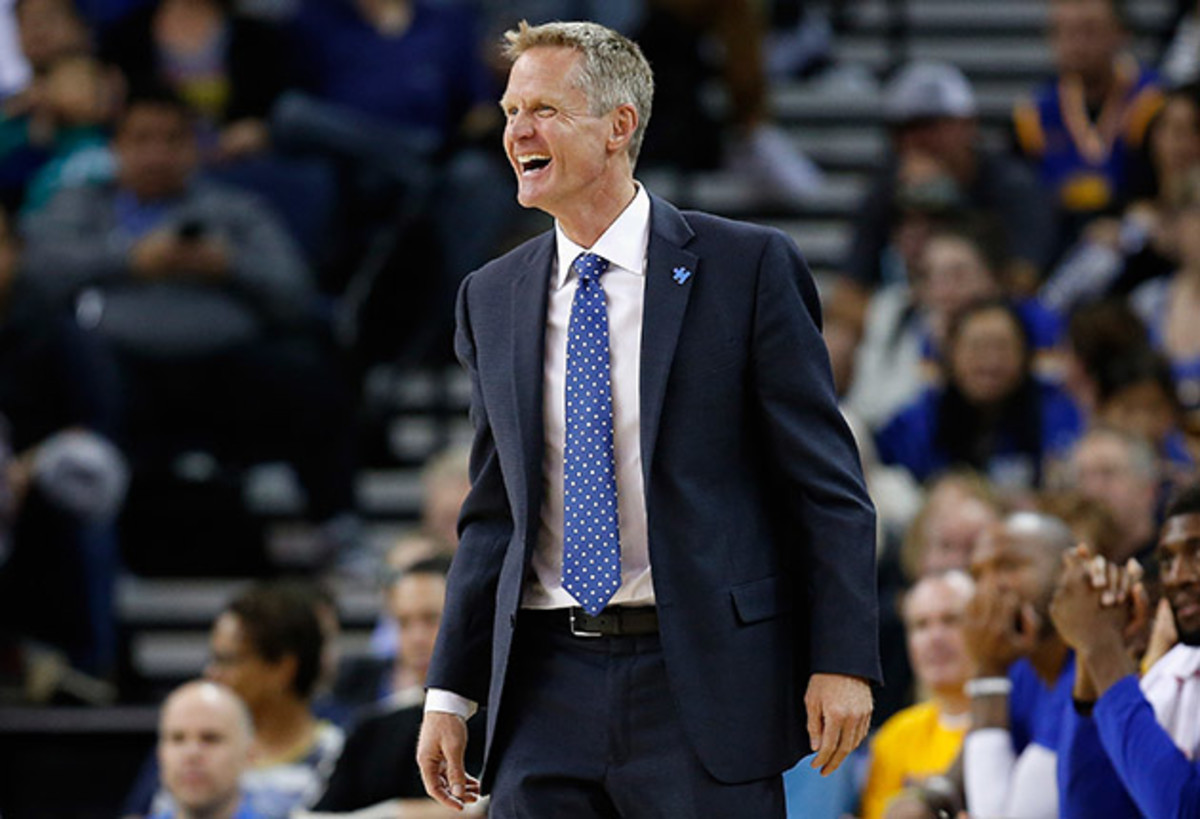
Coach of the Year
Ben Golliver: Steve Kerr, Warriors
1. Kerr, 2. Dwane Casey, 3. Terry Stotts
This year’s Coach of the Year field is legitimately loaded: Golden State has two credible candidates on the official ballot (!) while Gregg Popovich, Dwane Casey, Terry Stotts, Brad Stevens, Steve Clifford, and Dave Joerger, among others, all have compelling cases. What’s the best way to sift through this deep list? Don’t overthink it: Reward Kerr for Golden State’s historic success and make up for last year’s snubbing (No offense to Atlanta’s Mike Budenholzer).
After winning 67 games in his rookie season, Kerr further demonstrated his value during an extended health-related absence at the opening of 2015–16. Some teams would crumble or at least slip when led by a substitute teacher. Not the Warriors, who ripped off a record start under interim coach Luke Walton and then went on to win 72 (and counting) games thanks in part to the strong culture and foundation established by Kerr. His carefully cultivated philosophies on offense and defense have gotten the most out of his key players (Stephen Curry, Draymond Green and Klay Thompson) while also providing structure when multiple secondary contributors (Harrison Barnes, Andre Iguodala, Andrew Bogut) have missed time due to injuries. Finally, Kerr’s ability to manage pace, playing time and the mental grind that comes with a historic chase has helped keep his team happy, energetic and focused—three central keys to their success.
Casey is a worthy runner-up, as he guided Toronto to its first 50-win campaign despite his lame-duck contract status. He successfully integrated many new faces (Cory Joseph, Bismack Biyombo, Luis Scola, Norman Powell) without taking anything away from his old guard offensive centerpieces (Kyle Lowry and DeMar DeRozan). Meanwhile, Stotts was dealt a bum off-season hand, losing four starters to trades and free agency, but he swiftly adapted his three-happy offense around scoring guards Damian Lillard and C.J. McCollum. As a result, he has returned an overachieving Portland team to the playoffs for the third straight year.
Lee Jenkins: Steve Kerr, Warriors
1. Kerr, 2. Gregg Popopich, 3. Steve Clifford
Maybe the Warriors could slice off part of the trophy—an arm, let’s say—for Luke Walton, who piloted the team during its historic start. Gregg Popovich, Steve Clifford, Brad Stevens and Dwane Casey are all worthy of consideration, but it’s hard to argue against Kerr, who has kept the Warriors winning and grinning when they have every reason to grow complacent.
Andrew Sharp: Steve Kerr, Warriors
1. Kerr, 2. Dwane Casey, 3. Gregg Popovich
Did you know that Steve Kerr didn't win Coach of the Year last season? I didn't, until Ben Golliver brought it up on our podcast. For that reason alone, he gets the nod here over Casey (who's been incredible turning things around in Toronto) and Pop (who is in full late-90s MJ mode as a coach), as well as Terry Stotts (the Blazers have been shocking all year long) and Brad Stevens (not running for President, but could definitely go to NBA Reddit and start his own religion). Everyone mentioned has been incredible, and there is no wrong answer among these five. But if anyone needs a tiebreaker, it feels right to go with the coach whose system has taken over the whole damn league over the past two years.
Rob Mahoney: Steve Kerr, Warriors
1. Kerr, 2. Gregg Popovich, 3. Steve Clifford
There are more reasonable candidates for Coach of the Year this season than for any other award; many deserving individuals (Terry Stotts, Brad Stevens, Quin Snyder, etc.) won’t even make my three-man ballot. Still, it seems that we might be overthinking things when it comes to actually handing out the hardware. Kerr is a coach who, in a single season, built a culture strong enough that he could hand-pick an unproven assistant to keep the team rolling in his absence. He returned from a painful, trying ordeal to keep that team on track the rest of the way, balancing the schedule and the team’s pursuit of history as best as possible. Because of Kerr, the Warriors have cultivated an atmosphere where Curry runs free, Draymond’s flare-up is understood and packed away, and championship-level basketball remains fun—even under heightening levels of scrutiny and pressure.
DeAntae Prince: Steve Kerr, Warriors
1. Kerr, 2. Terry Stotts, 3. Dave Joerger
The Warriors have created history, reaching 72 wins and tying the Chicago Bulls without ever displaying any visible drop-off. Although they have a team of veteran stars to keep them on the right path, Steve Kerr’s presence has kept them on the straight and narrow as well. His even-keeled approach to a season chasing history has normalized the abnormal and pushed the Warriors to one of the best seasons the league has ever seen.
Jeremy Woo: Steve Kerr, Warriors
1. Kerr, 2. Dave Joerger, 3. Terry Stotts
By far, this was the toughest pick to make. I thought about Dave Joerger essentially overseeing a small hospital in Memphis, and Terry Stotts losing four starters from a 50-win team and flipping castaway, discounted parts into another playoff berth. There was Steve Clifford turning the post-hype Hornets into a well-oiled three-and-D unit, Dwane Casey steering the surprisingly consistent Raptors, general wizard Brad Stevens and Gregg Popovich being Gregg Popovich. Which brings us to Kerr, who as Golliver pointed out on our podcast, did not win this award last year. The Warriors are even better now, historically so, and that doesn’t need much more explanation. Sure, they have good players, but there are coaching caveats and road bumps that come with running any Hollywood production like Golden State, and Kerr’s handled them all expertly (shoutout Luke Walton, too). Ultimately, I’m just not cool with Kerr walking away with no individual recognition after two dominant seasons. In the end, voting was that simple.
